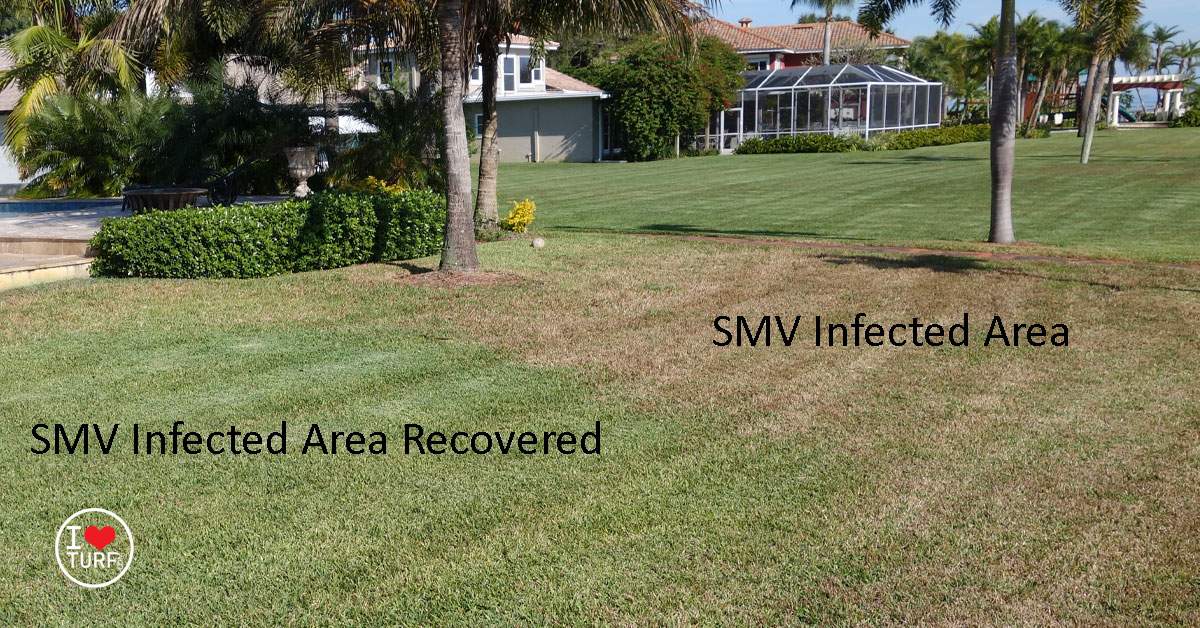
0
Sugarcane Mosaic Virus (SMV)
In the past Sugarcane Mosaic Virus (SMV) was isolated to the coastal areas of southern Pinellas. Currently SMV has spread to most of Pinellas. It is prevalent along the southern coastal areas, however there are infected lawns in Seminole and Clearwater.
SMV Symptoms

SMV infected lawns are yellow-green to brown. The leaves remain erect and the canopy does not completely collapse. The infected areas are often random shapes and can be any part of the lawn or the entire lawn. Often the infected areas will stop along straight or nearly straight lines
The leaves will have a rectangular patchwork of green, yellow, and brown caused by SMV destroying induvial cells. The most definitive way to tell if you have SMV is the leaves will have a rectangular patchwork of green, yellow and brown.
SMV is Mostly Sub-Lethal
Lawns infected with SMV range from mild to severe. Mild to moderate infections have proven to be sub-lethal causing only cosmetic problems. In severe cases, SMV destroyed the lawn. I suspect that the lawn may have been under severe distressed prior to the infection.

Lawns Infected with SMV Recover and are Immune
A lawn that had the virus in 2014 in a small area completely recovered in 2015. However, the uninfected areas in 2014 became infected in 2015. In 2016 the infected areas recovered. This would suggest, that SMV-infected areas will be immune. This gives hope the disease is not a constant nemesis destroying your lawn, but rather a one-time infection, and the lawn recovers. The drawback is that from September through the following spring the lawn is not very pretty, but it does recover!
Control and Prevention
There is no control and there is no prevention for SMV. Sanitization will not work – even if you manage to keep the mower and allied equipment sanitized, you cannot prevent other methods of infection from spreading the disease – like insects, mammals, or birds.
Best Management Practice for SMV: Relax!
SMV is sub-lethal, your lawn will most likely recover and be immune. The best thing that could happen is to have a mild infection to immunize your lawn. Regular care of your lawn is all that is required – keep mowing, watering, fertilizing, etc. - like normal.
Don’t Be Discouraged
Lawns are not what is wrong with the urban environment – lawns are what is right about the urban environment. Lawns are a biological filter surrounding your home – the more lawns the cleaner our environment. Don’t let a minor problem like SMV discourage you from being a part of a big solution to pollution – urban turf.
Other Warnings and Advice: There are those groups and individuals who will use SMV to discourage you from investing your time and money into a lawn. They want your lawn to disappear and the land covered with recycled yard waste. They want you to shut off your irrigation and stop putting chemicals on your lawn and go “green” with a brown lawn. They think lawns are the root of landscape evil. Don’t believe them! They are haters! They are the lawn haters – from environmental groups to the Tampa Bay Water Users – they hate your lawn.




